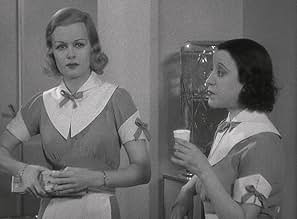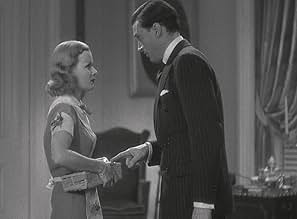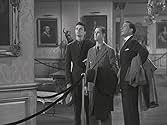NOTE IMDb
6,5/10
1,2 k
MA NOTE
Ajouter une intrigue dans votre langueSassy manicurist Eve Fallon is recruited as an even more brassy reporter and she helps police detective boyfriend Danny Barr break a jewel theft ring and solve the murder of a baby.Sassy manicurist Eve Fallon is recruited as an even more brassy reporter and she helps police detective boyfriend Danny Barr break a jewel theft ring and solve the murder of a baby.Sassy manicurist Eve Fallon is recruited as an even more brassy reporter and she helps police detective boyfriend Danny Barr break a jewel theft ring and solve the murder of a baby.
- Réalisation
- Scénario
- Casting principal
- Récompenses
- 2 victoires au total
Henry Brandon
- Don Butler
- (as Henry Kleinbach)
Fred Anderson
- Elevator Operator
- (non crédité)
William Arnold
- Customer
- (non crédité)
Mary Bovard
- Manicurist
- (non crédité)
Don Brodie
- Customer
- (non crédité)
Ralph Brooks
- Man Exiting Elevator
- (non crédité)
Avis à la une
And in that of Raoul Walsh, as well. The early scenes, which try really hard to be cute, show no influence of Walsh. When it gets more into the career of policeman Grant, we see some fast-paced action and it makes sense as a Walsh project. Sort of.
Grant was young and hadn't become a major star yet. He looks great and does a creditable job. His female co-star is Joan Bennett. Now there was an interesting actress: She worked with all the great foreign directors when they came to Hollywood. She made several movies for Fritz Lang. She worked for Max Ophuls. She worked for Jean Renoir.
Here she is a blonde, like sister Constance. She's fine.
Walter Pidgeon looks young too. He is cast in the sort of role Robert Montgomery or Warren William got more frequently: He's a charming crook.
When the movie begins, Bennett is a manicurist. Then, suspiciously quickly, she's an ace newspaper reporter. Was this little film assembled from various attempts or is the plot just a little unconvincing? There are many wonderful reaction shots that move quickly from close-up of one bit player or extra to close-up of another. I think the most famous use of this sort of extreme close-up is that of the chatty woman in "Brief Encounter." But the ones here are great. Indeed, they elevate what is essentially a trivial movie up a notch or two.
Grant was young and hadn't become a major star yet. He looks great and does a creditable job. His female co-star is Joan Bennett. Now there was an interesting actress: She worked with all the great foreign directors when they came to Hollywood. She made several movies for Fritz Lang. She worked for Max Ophuls. She worked for Jean Renoir.
Here she is a blonde, like sister Constance. She's fine.
Walter Pidgeon looks young too. He is cast in the sort of role Robert Montgomery or Warren William got more frequently: He's a charming crook.
When the movie begins, Bennett is a manicurist. Then, suspiciously quickly, she's an ace newspaper reporter. Was this little film assembled from various attempts or is the plot just a little unconvincing? There are many wonderful reaction shots that move quickly from close-up of one bit player or extra to close-up of another. I think the most famous use of this sort of extreme close-up is that of the chatty woman in "Brief Encounter." But the ones here are great. Indeed, they elevate what is essentially a trivial movie up a notch or two.
Big Brown Eyes (1936)
*** (out of 4)
Detective Danny Barr (Cary Grant) is trying to track down some jewel thieves but one day he is given the grim news that a baby has been shot and killed in a park. He finds that the two crimes are connected but can't get any real clues until his girlfriend Eve (Joan Bennett) goes to work for a newspaper.
Yes, you heard the plot of BIG BROWN EYES correct. It's a movie that features a baby being shot and killed. That was a rather dark subject for any period of films but you have to wonder how that plot point got past the Hayes Office just a year after they were coming down on certain topics. Apparently a film with a baby being shot was okay as long as the male and female stars weren't kissing for over five seconds.
As far as the film goes, director and co-writer Raoul Walsh does a very good job at mixing several genres together and in the end they all work quite well. You've got the mystery of the jewel thieves and the baby murder. You've got the back and forth romance between Grant and Bennett. You've also got some comedy thrown in for good measure, although the killing of the baby is a tad bit dark for the rest of the picture. All of these elements work very well and it plays out quite nicely.
Grant was yet a major star but you can see the comic timing really starting to come out here. I've been going through his films in the order that he made them and this role was clearly one of the best of his early career. He got to play the tough cop and do it nicely but his comic and romantic timing is that classic Grant. Bennett is also very good in her supporting role and makes for some good charm and there's no question that the two leads have some nice chemistry. Walter Pidgeon, Lloyd Nolan and Joe Sawyer are also good in their supporting bits.
BIG BROWN EYES isn't all that well known, which is a tad bit shocking considering the cast, the director and the fact that it's a good movie. The film even has some fun with Grant having him play a ventriloquist. There's even more fun to be had when Bennett says a classic Mae West line to him.
*** (out of 4)
Detective Danny Barr (Cary Grant) is trying to track down some jewel thieves but one day he is given the grim news that a baby has been shot and killed in a park. He finds that the two crimes are connected but can't get any real clues until his girlfriend Eve (Joan Bennett) goes to work for a newspaper.
Yes, you heard the plot of BIG BROWN EYES correct. It's a movie that features a baby being shot and killed. That was a rather dark subject for any period of films but you have to wonder how that plot point got past the Hayes Office just a year after they were coming down on certain topics. Apparently a film with a baby being shot was okay as long as the male and female stars weren't kissing for over five seconds.
As far as the film goes, director and co-writer Raoul Walsh does a very good job at mixing several genres together and in the end they all work quite well. You've got the mystery of the jewel thieves and the baby murder. You've got the back and forth romance between Grant and Bennett. You've also got some comedy thrown in for good measure, although the killing of the baby is a tad bit dark for the rest of the picture. All of these elements work very well and it plays out quite nicely.
Grant was yet a major star but you can see the comic timing really starting to come out here. I've been going through his films in the order that he made them and this role was clearly one of the best of his early career. He got to play the tough cop and do it nicely but his comic and romantic timing is that classic Grant. Bennett is also very good in her supporting role and makes for some good charm and there's no question that the two leads have some nice chemistry. Walter Pidgeon, Lloyd Nolan and Joe Sawyer are also good in their supporting bits.
BIG BROWN EYES isn't all that well known, which is a tad bit shocking considering the cast, the director and the fact that it's a good movie. The film even has some fun with Grant having him play a ventriloquist. There's even more fun to be had when Bennett says a classic Mae West line to him.
Cary Grant and Joan Bennett co-star in Big Brown Eyes which had it been done over at Warner Brothers would have been standard material for James Cagney and Joan Blondell. In fact the whole project was an unusual one for Paramount, it was a gritty urban drama that Warner Brothers specialized in.
Grant is a police detective and Bennett a manicurist turned reporter (only in Hollywood) who team up in life and who team up to solve a series of robberies. What begins as high end jewel robberies turns deadly serious when during a payoff gone bad, a baby is killed in the park by a stray bullet.
When the doer Lloyd Nolan is acquitted in court due to perjured testimony and political influence, Grant quits the force and Bennett goes back to manicuring and look for justice in an unofficial manner. Need I say they get it though you have to see Big Brown Eyes to find out how its done. But I will say that forensics and Bennett's manicurist training does help a lot.
Walter Pidgeon is also in the cast as a crooked politician, hip deep in the rackets, a type that Thomas E. Dewey was putting in jail with increasing frequency in New York at the time. Two very funny supporting performances come from Marjorie Gateson as an amorous robbery victim with an eye for Cary Grant and Douglas Fowley who was one of the gang that they trick into squealing. That is the highlight of the movie.
Big Brown Eyes is a slick comedy directed by Raoul Walsh who gets the whole cast in sync like a Swiss watch. An unusual film for Cary Grant, but his fans will like it.
Grant is a police detective and Bennett a manicurist turned reporter (only in Hollywood) who team up in life and who team up to solve a series of robberies. What begins as high end jewel robberies turns deadly serious when during a payoff gone bad, a baby is killed in the park by a stray bullet.
When the doer Lloyd Nolan is acquitted in court due to perjured testimony and political influence, Grant quits the force and Bennett goes back to manicuring and look for justice in an unofficial manner. Need I say they get it though you have to see Big Brown Eyes to find out how its done. But I will say that forensics and Bennett's manicurist training does help a lot.
Walter Pidgeon is also in the cast as a crooked politician, hip deep in the rackets, a type that Thomas E. Dewey was putting in jail with increasing frequency in New York at the time. Two very funny supporting performances come from Marjorie Gateson as an amorous robbery victim with an eye for Cary Grant and Douglas Fowley who was one of the gang that they trick into squealing. That is the highlight of the movie.
Big Brown Eyes is a slick comedy directed by Raoul Walsh who gets the whole cast in sync like a Swiss watch. An unusual film for Cary Grant, but his fans will like it.
This little movie is more than forgotten. It is so mundane that no one has decided they can make a nickle from it, despite having some of the very same features and creative crew as projects that are celebrated. Cary Grant is about the same here, as in, say, "Charade."
I have to admit, it is flat. It all can be laid at the feet of the writer, I suppose.
These comedies are delicate. I suppose they cannot be engineered, like so much in film can. Oh, the execution can of course, but if the writer doesn't froth intuitively, nothing can spin it in after the fact.
But then again, this was the 30's where experimentation was the rule. And I suppose you need several failures before you get a "His Girl Friday" (which this resembles) out of so many tries.
Ted's Evaluation -- 1 of 3: You can find something better to do with this part of your life.
I have to admit, it is flat. It all can be laid at the feet of the writer, I suppose.
These comedies are delicate. I suppose they cannot be engineered, like so much in film can. Oh, the execution can of course, but if the writer doesn't froth intuitively, nothing can spin it in after the fact.
But then again, this was the 30's where experimentation was the rule. And I suppose you need several failures before you get a "His Girl Friday" (which this resembles) out of so many tries.
Ted's Evaluation -- 1 of 3: You can find something better to do with this part of your life.
An adequate comedy/mystery, one that is serviceable while playing but will scarcely be remembered long after it concludes. In all fairness, the jumbled screenplay by Bert Hanlon and director Raoul Walsh has a reasonable degree of intriguing ideas spread throughout the picture's scant runtime, but the various story threads never gel into a completely coherent picture and the film is further hindered by some woefully leaden dialogue among it's lead characters. The film is still wholly watchable, and even enjoyable during certain stretches due to it's lead performers. The chemistry between Cary Grant and Joan Bennett (as a bickering couple thrown into a case involving stolen jewels and murder) is breezy and natural, and the duo significantly better the film with their thoroughly winning performances.
Le saviez-vous
- AnecdotesAt 20 minutes, Eve Fallon (Joan Bennett) says to Danny Barr (Cary Grant), with a flirtatious wink, "if you happen to be around my way, come up and see me some time". This appears to refer to a famous, almost identical line said by Mae West to Cary Grant in "She Done Him Wrong" (1933), a playful in-joke that would have been obvious to contemporary audiences.
- Citations
Richard Morey: Cortig, if you bought a gift for a girl and she refused to accept it, what would you do?
Russ Cortig: [with a slow smile] I'd give it to my wife.
- ConnexionsFeatured in The True Adventures of Raoul Walsh (2014)
Meilleurs choix
Connectez-vous pour évaluer et suivre la liste de favoris afin de recevoir des recommandations personnalisées
- How long is Big Brown Eyes?Alimenté par Alexa
Détails
- Durée1 heure 17 minutes
- Couleur
- Rapport de forme
- 1.37 : 1
Contribuer à cette page
Suggérer une modification ou ajouter du contenu manquant

Lacune principale
By what name was Empreintes digitales (1936) officially released in India in English?
Répondre
































